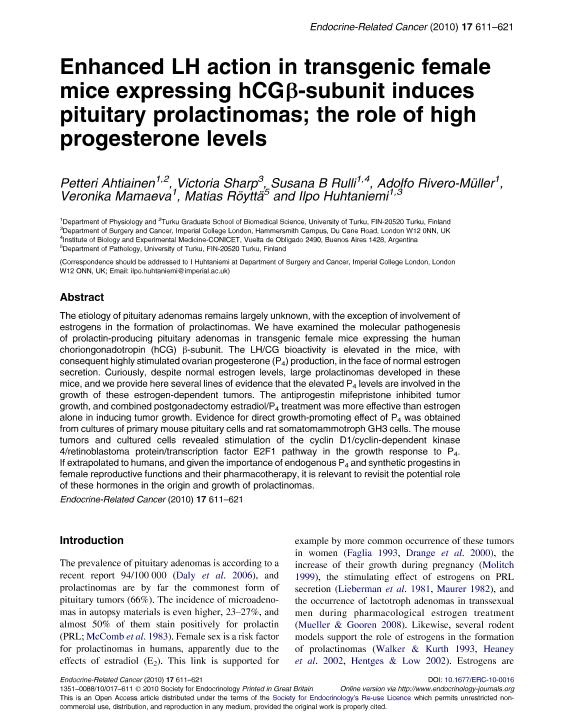Artículo
Enhanced LH action in transgenic female mice expressing hCGbeta-subunit induces pituitary prolactinomas; the role of high progesterone levels
Ahtiainen, Pettieri; Sharp, Victoria; Rulli, Susana Beatriz ; Rivero Müller, Adolfo; Mamaeva, Veronika; Röytta, Matias; Huhtaniemi, Ilpo
; Rivero Müller, Adolfo; Mamaeva, Veronika; Röytta, Matias; Huhtaniemi, Ilpo
 ; Rivero Müller, Adolfo; Mamaeva, Veronika; Röytta, Matias; Huhtaniemi, Ilpo
; Rivero Müller, Adolfo; Mamaeva, Veronika; Röytta, Matias; Huhtaniemi, Ilpo
Fecha de publicación:
03/06/2010
Editorial:
Bioscientifica
Revista:
Endocrine - Related Cancer
ISSN:
1351-0088
e-ISSN:
1479-6821
Idioma:
Inglés
Tipo de recurso:
Artículo publicado
Clasificación temática:
Resumen
The etiology of pituitary adenomas remains largely unknown, with the exception of involvement of estrogens in the formation of prolactinomas. We have examined the molecular pathogenesis of prolactin-producing pituitary adenomas in transgenic female mice expressing the human choriongonadotropin (hCG) beta-subunit. The LH/CG bioactivity is elevated in the mice, with consequent highly stimulated ovarian progesterone (P(4)) production, in the face of normal estrogen secretion. Curiously, despite normal estrogen levels, large prolactinomas developed in these mice, and we provide here several lines of evidence that the elevated P(4) levels are involved in the growth of these estrogen-dependent tumors. The antiprogestin mifepristone inhibited tumor growth, and combined postgonadectomy estradiol/P(4) treatment was more effective than estrogen alone in inducing tumor growth. Evidence for direct growth-promoting effect of P(4) was obtained from cultures of primary mouse pituitary cells and rat somatomammotroph GH3 cells. The mouse tumors and cultured cells revealed stimulation of the cyclin D1/cyclin-dependent kinase 4/retinoblastoma protein/transcription factor E2F1 pathway in the growth response to P(4). If extrapolated to humans, and given the importance of endogenous P(4) and synthetic progestins in female reproductive functions and their pharmacotherapy, it is relevant to revisit the potential role of these hormones in the origin and growth of prolactinomas.
Palabras clave:
Chorionic Gonadotropin
,
Prolactinoma
,
Transgenic Mice
,
Pituitary
Archivos asociados
Licencia
Identificadores
Colecciones
Articulos(IBYME)
Articulos de INST.DE BIOLOGIA Y MEDICINA EXPERIMENTAL (I)
Articulos de INST.DE BIOLOGIA Y MEDICINA EXPERIMENTAL (I)
Citación
Ahtiainen, Pettieri; Sharp, Victoria; Rulli, Susana Beatriz; Rivero Müller, Adolfo; Mamaeva, Veronika; et al.; Enhanced LH action in transgenic female mice expressing hCGbeta-subunit induces pituitary prolactinomas; the role of high progesterone levels; Bioscientifica; Endocrine - Related Cancer; 17; 3; 3-6-2010; 611-621
Compartir
Altmétricas



